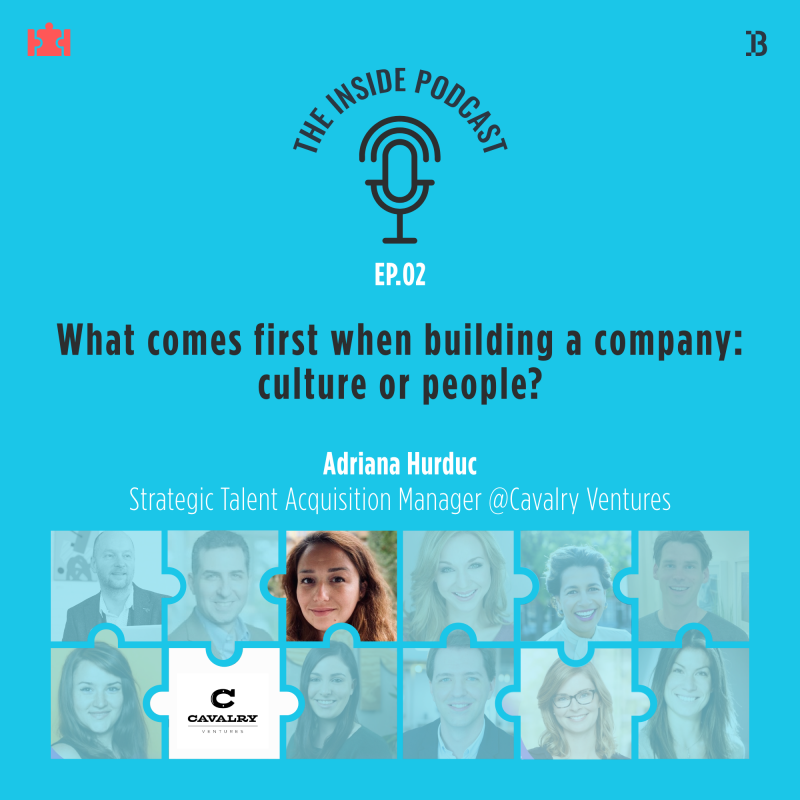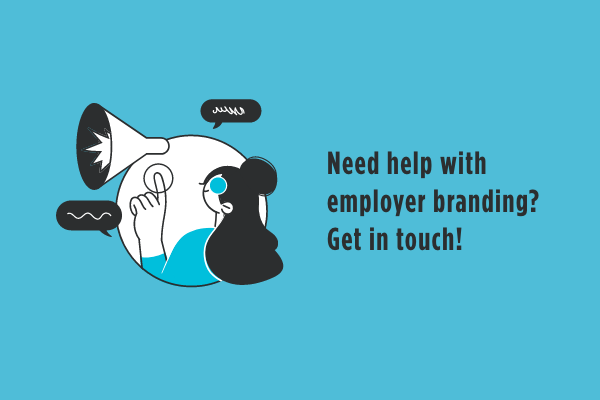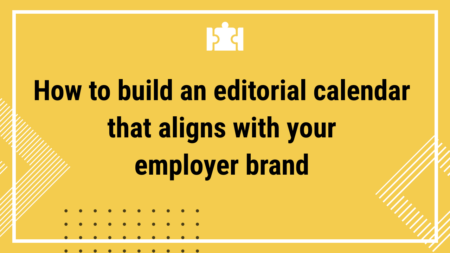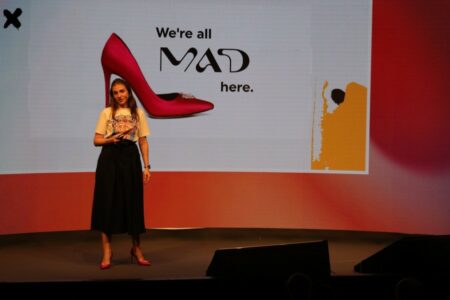Overview
We’re back with Episode 2 of Employer Branding: The Inside Podcast! This time around we’ve had the pleasure of speaking with Adriana Hurduc about building a company culture. Adriana is a Strategic Talent Acquisition Manager at Cavalry Ventures, and she shared with us some interesting insights on the importance of people and people teams when you’re just starting out building a company from the ground up. Tune in for more!
What you’ll learn by listening
- What makes a good culture in the early stages of a company
- The importance of building an internal company culture first
- The level of interest companies have in building a culture with a solid employer brand
- The evolution of the company culture as a concept
- Tips & tricks on how to fix broken recruitment
- Useful insights on remote work
- Recruitment is teamwork, not a one man job
About the company
Cavalry Ventures is a partnership based venture capital fund with €120m+ under management. We make early-stage investments in teams who question the status quo and think big. All of us have started and run companies for a living and we have invested in and supported many companies over the past years.
We are hands-on, operations-driven, and laser-focused on enabling early-stage entrepreneurs who have the ambition to transform important markets to build the next big thing. By providing not only financial support but connecting founders with the people, resources, and knowledge needed along the way we aim to prepare our portfolio companies for Series A and ultimately make a lasting impact.
Podcast link
Podcast transcription – Enjoy listening to S03Ep02 of The Inside Podcast!
Georgiana: Hi, everyone! This is Georgiana and you’re listening to a new episode of Employer Branding: The Inside Podcast. And today I’m really happy to be talking to someone I’ve met for quite a long time here in Berlin and is actually one of my friends I can say. Her name is Adriana Hurduc. And she works as a Strategic Talent Acquisition Manager at Cavalry Ventures. And when I first met Adriana, she was working only as a Talent Acquisition Manager, if I recall. Well, but anyway, Adriana, tell us exactly what you do today. And maybe also speak about your previous role with Clue, if you can. Welcome!
Adriana Hurduc: Thank you for having me, Georgiana. So, I have joined Cavalry Ventures around one year as a Strategic Talent Acquisition Manager. And what I’m currently doing is basically supporting our portfolio companies in a strategic level, consultancy way, on everything that is related to talent acquisition; and also expanding a bit to other topics within the people department. And when I was at Clue, I was purely doing talent acquisition. And of course, next to that always helping my colleagues in admin, onboarding, offboarding. And I mean, everything else that we would probably cover as a talent acquisition in a company, especially in a small team. So I guess I kind of touched points on everything related to the people department.
Georgiana: And Adriana, is there a difference between the two, between a Strategic Talent Acquisition Manager and the traditional Talent Acquisition Manager? How do they differ? The two?
Adriana Hurduc: I think it’s based on the company that you’re joining. But in my case, with Cavalry, I’m just kind of consultancy support for the portfolios. So I’m not really doing hands-on work with any particular companies at the moment. Whereas in the previous team, I used to do the entire work part of recruitment, obviously, with support from my interns. I think this is the main difference. Obviously, it’s a strategic position. So you provide strategic advice, or consultancy to portfolio companies.
Georgiana: And Cavalry is quite a small company in itself. But you guys have a big portfolio of investments. I was curious, in your working with the companies in the portfolio, how often have you come across the concept of company culture or employer branding, in general?
Adriana Hurduc: Okay. So Cavalry, as a firm, has a significant amount of investments. And I mean, this is one of the reasons why I have been brought; to kind of be able to help companies decide on how to structure the HR people teams from an early stage as Cavalry is mostly doing investments in pre-seed and seed companies.
And most of the time, you will also work with founders that maybe didn’t really work in a company before or they have, but they haven’t really dealt with how people teams would look like, or what’s the relevance, the importance of that. I’m here to support them and guide them from an early stage and why I think it would be a healthier setup for them. And how, obviously, how teams can influence the company and how there is potential growth.
As from what I have seen in the market, in my last eight years in Berlin, is that a lot of young companies don’t really understand the need of a people team from an early stage and the influence that it can actually have. And, yeah, I guess that’s why I’m here now.
Georgiana: And these companies that you’re working with and the companies that are just starting out, how well prepared are they when it comes to creating a good company culture?
Adriana Hurduc: First of all, a lot of them don’t know what a company culture means. So they’re always trying to put this on the future HR teams. But I have always, and I’m always going to tell the young companies that, the company culture is basically you as a founder, at least, at a certain level.
So you’re defining the company cultures as a founder, and it’s something that I basically tell them. They realise and they definitely work on that, and the biggest majority of them are interested in that. Sometimes it doesn’t come into play, or doesn’t get such a high importance from the founders until the latest stage, because obviously, if you’re just two founders and just started working on a potential product you have to have things to worry about first.
You must create, or build a company that is stable, and then you start thinking of other points. I mean, there’s too much to cover. And sometimes it’s true that company culture comes into play a bit later. But it’s there. At least they think about it, but they don’t focus that much on it, initially. It is what it is. I mean, you cannot do everything in your first two years.
Georgiana: That’s true. And to be honest, I’ve seen some cases, not many, but I’ve seen some in which so much concern was given to pinning down the company culture, the values, the mission of the company, that not much attention and much care was actually put on the most important resource; on the people and on creating the actual culture, you know. They were so concerned with just pinning down the values, and we have to have a good culture on the website. Yeah, so you forget the essential then! Right?
Adriana Hurduc: Exactly! I mean, how can you pin those things down? If you don’t have them defined internally, yet? In my opinion, the best culture and the best employer brand is basically your employees. And if you know how to build that culture internally, then it’s going to be very easy to present that externally. And that’s where a lot of companies fail, in my opinion. They, as you mentioned, are very focused on writing down things and just put them on their website, but do they actually leave them? They just think Employer Branding is purely just putting something on your website, but it’s not that.
Georgiana: Right, exactly! Which is why some people, some companies come to us and tell us, we also want to do some Employer Branding, but like, you don’t need it. No, but it’s hip. It’s in style. We have to do it. It doesn’t work like that.
Adriana Hurduc: Yeah, I would expect it’s very common.
Georgiana: Yes. Especially in a culture, such as the Berlin one. Yes, yeah. Getting back to, to our podcast. How much importance do most companies attach to this concept of company culture or employer branding? Do you feel that it’s greater the bigger the company is? Or is it the other way around? The smaller it is, the more interest there is going to be for people and culture in general.
Adriana Hurduc: I think that the bigger you are, of course, like the more you grow as a company, then it is expected to pay more attention to that. But a lot of companies don’t, even though they’re growing. And that’s because people’s departments and people topics almost always come last. Companies don’t really get support or advice on when they have to start working on these topics.
But generally, you see a trend of companies investing more into employer brand name or company culture or people departments even when they get to like, either 100 plus, 150 employees plus. Before that they don’t put too much focus because they believe that the resources that they have to spend on it, and also the cash that basically comes into it, is significant. And in most of the cases they don’t see any interest in that.
Georgiana: And I know you’ve worked in quite a few companies in Germany, but it has been a few years anyway. So do you feel that the understanding of company culture has changed over the years in Berlin? At least?
Adriana Hurduc: I think it really depends on the exposure that the founders have received before. I think, in most of the companies that I personally have seen, they didn’t know what company culture means, or at least they have heard the terminology. But I don’t know how accurate their understanding is about company culture, and if they actually do anything about that. But it’s definitely more important.
And I think it’s also important because there is a huge competition on the market right now. And, you know, people are candidates who care more about the company culture as well, they care about how the founders think, and what is their approach. So, I think this is going to become more important in the coming years, because people change their mentality as well, quite a lot. So I really hope this is going to become a big point in the future.
Georgiana: Yes, so do I. Because that brings me to my next question, you know, I haven’t been in Berlin in tech as long as you have. But in my almost four years here, I’ve witnessed a huge gap between what companies state and what they do, you know, like broken recruitment and interviewing processes, overworking employees, xenophobia, sexism in the workplace, why is such a big gap? And why does it happen? When all these companies state that they are the best? They are so inclusive?
Adriana Hurduc: Yeah. In my opinion, every time someone is using “we are the best ”, I mean, you have first of all, to define best and what is best, right? Every single one of us has different expectations and different visions, I guess. But broken recruitment? Definitely, I really believe that in larger companies, their interviewing processes are nonexistent or not structured well, or they’re very long, especially when you think of the competition that is currently on the market. I think you just, you really need someone that has expertise in that; to assess your interviewing processes, and what you actually want to achieve with that.
Overworked employees, I think that point has changed a bit. I really have the feeling that the majority of the employees don’t really have to work as much anymore. I have the feeling that the majority of us have learned how to or when to say no, and request support from the company and get more resources in house. And on the other topics, besides the big pay gap difference in Germany, which I still don’t understand why it exists. And this could be fixed quite easily. But a lot of companies don’t want to introduce more fixed salary benchmarking and better feedback processes and so on and so forth. I have heard of it but I haven’t really experienced that myself as much. I cannot really comment on that topic.
Georgiana: Yeah. Okay. Now we come to this huge topic called remote work. How does Cavalry Ventures see it and how do the companies in your portfolio look at it?
Adriana Hurduc: As we see it, we’re still remote. We also have a very small team and we can do the job in a remote setup. We have seen that it works for us. I don’t know if it works for others, but I think as long as you don’t have a physical product, things should work in a remote setup. When COVID things are going to calm down a bit, we will have a hybrid setup.
So we will try to be in the office once or twice a week, as everyone, I think not everyone, but like 90% of the employees are based in Berlin. So it would be nice to actually get to see the team as well. So we will have this setup, in terms of the other companies in the portfolio, we have a significant amount of them that are actually fully remote from the get go. That’s impressive. I think there’s going to be more and more companies out there that are going to start a remote setup from the beginning.
But at the same time, there’s also companies that if they’re based in Berlin, and majority are in Berlin, they still like to have an office where they can meet. I don’t think we have anyone in the portfolio right now that would be five days a week in the office. I don’t think we have anyone, so I think it’s really well seen, to be honest. Yeah.
Georgiana: Okay. Okay. Yeah, hopefully, that’s what I’m getting as feedback from everyone I know in Berlin. Everyone hopes to have some sort of flexible setup in which they can spend some days in the office and some days at home, at least, but not all companies are doing it.
Adriana Hurduc: It also depends on how you like working. In the end, not everyone likes to work fully remote or not everyone likes to work just at the office, or even hybrid or whatever. We’re all different. But I’m also thinking about myself. If I come to the office, then I kind of like, lose at least one hour a day on commuting, and then go out for lunch with your colleagues, and you have longer coffee chats in the kitchen.
Then, if you do that at home, and you’re distracted more easily, it is my case. So I sometimes have the feeling that I can’t achieve as much at the office as I can achieve at home, where I actually can focus more, and there’s no one to disturb me. So yeah, I think a nice mix between the two would work perfectly for me.
Georgiana: Yeah, so I guess it all boils down to what type of person you are, what type of environment you prefer. That’s true. Adriana, one thing you wish you’d known five years ago?
Adriana Hurduc: Wow, that’s a tough one. That’s a very difficult one. I actually don’t have a specific thing in mind. I think in five years, if you think about it, you get exposed to so many different points. But what I wish I would have known five years ago, there’s a lot of processes and how you structure these processes and how you can be flexible with talent acquisition processes and to read people much better, I guess. You get that gut feeling with experience. There’s not just one point. I guess it’s the entire package. What have I learned in five years? A lot.
Georgiana: I guess with experience, everyone learns and everyone has their internal processes combined with the company processes.
Adriana Hurduc: Yeah, but maybe as a point, I guess what you should know – especially if you’re at an early stage in your career – you should know that it’s fine to make a mistake. Because you don’t have the exposure. Sometimes I think I pinned that too hard on myself when I was making a mistake, which is sometimes normally. You’re younger, you’re less experienced, you have less exposure. So I think you just don’t have to be very harsh with yourself, which I think I used to do before, thinking like, oh my gosh, I should have known this. But in the end it’s like, no, because I haven’t been exposed to it before.
Georgiana: Yeah, exactly. One stereotype about talent acquisition managers?
Adriana Hurduc: Oh, stereotypes! I guess that the only one that I can think of and comes to mind right now is that in a lot of companies, when we think of talent acquisition partners or managers is that they have to hire people kind of on their own. But I think that a lot of times companies or hiring managers are not trained enough to understand it.
Actually, recruitment is teamwork. So, talent acquisition is there to provide the pipeline to provide the candidates and processes. But they’re not the ones making the decisions. And without the hiring managers, you can never find the right people. So I think this is a huge stereotype in talent acquisition in my opinion.
Georgiana: Yes, that’s true. I have to say, I was one of the people thinking the same thing about five, six years ago, so I totally understand.
Adriana Hurduc: So don’t feel guilty. If you cannot hire someone, most of the time it’s because maybe you need to work on your processes, or discuss long with your hiring managers and make them understand that they have a huge responsibility when hiring.
Georgiana: Yes, it’s shared responsibility in the end. Okay, and this brings me to my last question, which regards a resource that you find useful. And I remember us talking about your reading of very nice newsletters, which I’d really like you to share on this podcast.
Adriana Hurduc: Yeah, so I guess, there’s a lot of resources nowadays on the market. So I guess you’re like, what do you like most? But recently, I have been following two newsletters being in the venture capital world. One of them is Femme Street. It’s about women in tech or female founders. So I think that’s quite an interesting newsletter. And, but as I said, it’s more like guided towards the current industry that I’m in. And there’s the other one, which is called, The Friday Female. That one is also very close to female founders and investment opportunities. And so I think, you know, it’s not just that any, they’re expanding towards other areas as well. But these are basically the ones that I’m mostly reading right now compared to any other books.
Georgiana: Thank you for sharing this, Adriana. It’s been really nice talking to you today. I really enjoyed our friendly discussion. Thank you, and I look forward to seeing you soon.
Adriana Hurduc: Thank you as well and stay healthy!
Georgiana: Thank you. Bye!
This was Employer Branding: The Inside Podcast. You can find our podcasts on Spotify on Apple podcasts and content on employer branding-related things on employerbranding.tech. Until the next time, stay tuned.







